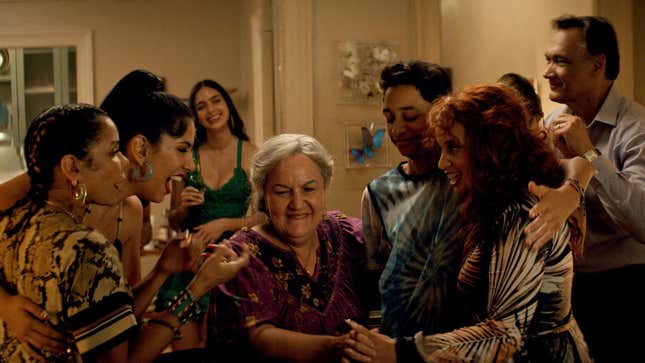A Chat About Immigration, Rap Musicals, and Crying With Olga Merediz, In the Heights's Abuela Claudia
"I want people to see that immigrants are like everyone else."
EntertainmentMovies

There are two things on this planet that have been making me cry for more than a decade. The first is the Disney film The Fox and the Hound. The second is the voice of actress Olga Merediz as she sings “Paciencia y Fe,” an absolutely heart-wrenching number from the original Broadway show, In The Heights, which she reprises in the film.
Merediz’s performance is a spine-tingling, high-note-sustaining journey of one woman’s life from poverty in Cuba to a new life in the United States marked by racism and finding her place in Washington Heights. Towards the end of the song, when Merediz tells the ghost of her mother, “I spent my life inheriting dreams from you/I made it through/I survived/I did it,” it is physically impossible to not shed a sea of tears. The film, directed by Jon M. Chu and out June 10, makes many changes to the original show—but thankfully, one thing that remains the same is Olga Merediz, belting out “Paciencia y Fe” alongside stunning visuals that render the song more powerful.
Jezebel spoke with Olga Merediz about her iconic role and how difficult it is to sing a song like “Paciencia y Fe” 13 years after the show originally debuted. Like Abuela Claudia, Merediz is an immigrant from Cuba, and she credits her own experience and those of the women in her family for giving her the necessary experience to create such an iconic character. This interview has been condensed and edited for clarity.
JEZEBEL: How did you first get involved with In the Heights when it was first making its way to Broadway?
OLGA MEREDIZ: Originally I was there to play Mrs. Rosario, Nina’s mother. And I remember, going all the way back to the first workshops, they could not find an elderly woman to play Abuela. Long story short, Quiara Alegría Hudes said let’s try Olga Merediz. I auditioned, I got the part, and I had to grow into the part and grow into the song. It’s a challenging song, emotionally, physically, breath-wise, technically. And I had to grow into it and I had to tell the story of Abuela Claudia, this immigrant that had come to America.
This song is her story and the story of so many different immigrants that have come to America for a better life. And so I had to embody that woman. And I used all the women in my family and all the women that I loved in my life to make her this quintessential matriarch that we all wanted in our lives as our mothers or just in our lives. And I had to kind of really tell that story in a profound, deep way. And by the time I did the film, it had taken yet another dimension, you know, a deeper dimension with Jon Chu’s directing and the whole cinema aspect of it.
You’ve been singing “Paciencia y Fe” for a long time, does it ever get easier?
No. It’s my opinion and perhaps I’m wrong, but if it gets easy, then you’re not singing the song. It’s got to cost you because you have to show what that woman, what Claudia and all the other matriarchs and caretakers, what they all went through.
When you first saw the concept Jon Chu was putting together for this number and the historical references he was putting into it, what was your initial reaction?
-

-

-

-

-

-

-

-

-

-

-

-

-

-

-

-

-

-

-

-

-

-

-

-

-

-

-

-

-

-

-

-

-

-

-

-

-

-

-

-








































